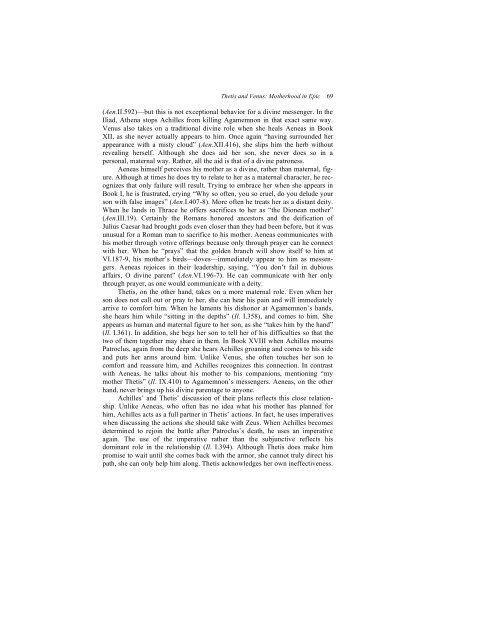You also want an ePaper? Increase the reach of your titles
YUMPU automatically turns print PDFs into web optimized ePapers that Google loves.
Thetis and Venus: Motherhood in Epic 69<br />
(Aen.II.592)—but this is not exceptional behavior for a divine messenger. In the<br />
Iliad, Athena stops Achilles from killing Agamemnon in that exact same way.<br />
Venus also takes on a traditional divine role when she heals Aeneas in Book<br />
XII, as she never actually appears to him. Once again “having surrounded her<br />
appearance with a misty cloud” (Aen.XII.416), she slips him the herb without<br />
revealing herself. Although she does aid her son, she never does so in a<br />
personal, maternal way. Rather, all the aid is that of a divine patroness.<br />
Aeneas himself perceives his mother as a divine, rather than maternal, figure.<br />
Although at times he does try to relate to her as a maternal character, he recognizes<br />
that only failure will result. Trying to embrace her when she appears in<br />
Book I, he is frustrated, crying “Why so often, you so cruel, do you delude your<br />
son with false images” (Aen.I.407-8). More often he treats her as a distant deity.<br />
When he lands in Thrace he offers sacrifices to her as “the Dionean mother”<br />
(Aen.III.<strong>19</strong>). Certainly the Romans honored ancestors and the deification of<br />
Julius Caesar had brought gods even closer than they had been before, but it was<br />
unusual for a Roman man to sacrifice to his mother. Aeneas communicates with<br />
his mother through votive offerings because only through prayer can he connect<br />
with her. When he “prays” that the golden branch will show itself to him at<br />
VI.187-9, his mother’s birds—doves—immediately appear to him as messengers.<br />
Aeneas rejoices in their leadership, saying, “You don’t fail in dubious<br />
affairs, O divine parent” (Aen.VI.<strong>19</strong>6-7). He can communicate with her only<br />
through prayer, as one would communicate with a deity.<br />
Thetis, on the other hand, takes on a more maternal role. Even when her<br />
son does not call out or pray to her, she can hear his pain and will immediately<br />
arrive to comfort him. When he laments his dishonor at Agamemnon’s hands,<br />
she hears him while “sitting in the depths” (Il. I.358), and comes to him. She<br />
appears as human and maternal figure to her son, as she “takes him by the hand”<br />
(Il. I.361). In addition, she begs her son to tell her of his difficulties so that the<br />
two of them together may share in them. In Book XVIII when Achilles mourns<br />
Patroclus, again from the deep she hears Achilles groaning and comes to his side<br />
and puts her arms around him. Unlike Venus, she often touches her son to<br />
comfort and reassure him, and Achilles recognizes this connection. In contrast<br />
with Aeneas, he talks about his mother to his companions, mentioning “my<br />
mother Thetis” (Il. IX.410) to Agamemnon’s messengers. Aeneas, on the other<br />
hand, never brings up his divine parentage to anyone.<br />
Achilles’ and Thetis’ discussion of their plans reflects this close relationship.<br />
Unlike Aeneas, who often has no idea what his mother has planned for<br />
him, Achilles acts as a full partner in Thetis’ actions. In fact, he uses imperatives<br />
when discussing the actions she should take with Zeus. When Achilles becomes<br />
determined to rejoin the battle after Patroclus’s death, he uses an imperative<br />
again. The use of the imperative rather than the subjunctive reflects his<br />
dominant role in the relationship (Il. I.394). Although Thetis does make him<br />
promise to wait until she comes back with the armor, she cannot truly direct his<br />
path, she can only help him along. Thetis acknowledges her own ineffectiveness.

















